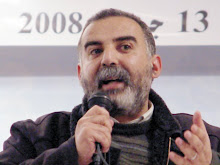
The International Federation of Journalists (IFJ) has strongly protested over attempts by Tunisian police to bar Néji Bghouri, the President of the Syndicat National des Journalistes Tunisiens (SNJT), from entering his office at the Essahafa newspaper yesterday.
The police only withdrew after Néji Bghouri and colleagues challenged the legality of their action.
"We condemn this latest incident of intimidation by Tunisian authorities," said Aidan White, IFJ General Secretary. "The action is another example of the contempt in which state agencies hold independently-minded journalists and citizens."
According to the SNJT, plain clothes police officers stopped Bghouri from entering his office at he arrived for work on Wednesday in the afternoon, claiming they were acting on orders from the Ministry of Interior. In the ensuing stand off Bghouri was joined by colleagues and passers by in challenging the police action. After furious exchanges the police were forced to leave and Bghouri was able to enter his office.
The IFJ says independent media in Tunisia have been victims of a government sponsored campaign of harassment and intimidation since the break up of the SNJT leadership which saw the creation last summer of a rival and pro government board seeking to control the syndicate.
This is the latest act of intimidation against independent journalists in recent months. Journalists Slim Boukdhir and Omar Mestiri have been assaulted and briefly detained by unknown attackers and prominent journalist Taoufik Ben Brik was sentenced to a six-month jail term on 26 November for assault, criminal damage and breach of public decency. His colleague Zoheir Makhlouf was jailed for three months and fined 3000 Euro for posting a video report on the Internet about environmental, economic and social problems in an industrial district.
"These are not isolated incidents," added White. "There is a pattern of discrimination and intimidation which we strongly oppose. The government must keep its hands off journalism and allow free voices in the country's media."
The police only withdrew after Néji Bghouri and colleagues challenged the legality of their action.
"We condemn this latest incident of intimidation by Tunisian authorities," said Aidan White, IFJ General Secretary. "The action is another example of the contempt in which state agencies hold independently-minded journalists and citizens."
According to the SNJT, plain clothes police officers stopped Bghouri from entering his office at he arrived for work on Wednesday in the afternoon, claiming they were acting on orders from the Ministry of Interior. In the ensuing stand off Bghouri was joined by colleagues and passers by in challenging the police action. After furious exchanges the police were forced to leave and Bghouri was able to enter his office.
The IFJ says independent media in Tunisia have been victims of a government sponsored campaign of harassment and intimidation since the break up of the SNJT leadership which saw the creation last summer of a rival and pro government board seeking to control the syndicate.
This is the latest act of intimidation against independent journalists in recent months. Journalists Slim Boukdhir and Omar Mestiri have been assaulted and briefly detained by unknown attackers and prominent journalist Taoufik Ben Brik was sentenced to a six-month jail term on 26 November for assault, criminal damage and breach of public decency. His colleague Zoheir Makhlouf was jailed for three months and fined 3000 Euro for posting a video report on the Internet about environmental, economic and social problems in an industrial district.
"These are not isolated incidents," added White. "There is a pattern of discrimination and intimidation which we strongly oppose. The government must keep its hands off journalism and allow free voices in the country's media."
For more information contact the IFJ at +32 2 235 2207
The IFJ represents over 600,000 journalists in 125 countries worldwide


